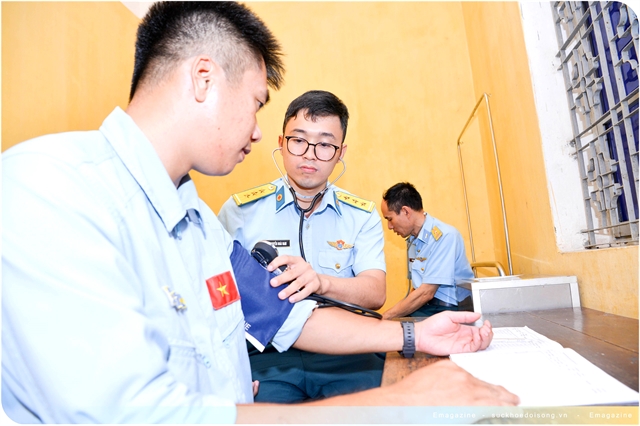 Society
Society

 |
| Doctor Tống Thanh Tú checks health conditions for a pilot before a training session. Photos suckhoedoisong.vn |
HÀ NỘI — As National Day approaches, Việt Nam’s military airfields buzz with intense training flights. But away from the engines’ roar, military doctors quietly carry the crucial task of safeguarding the pilots’ health — acting as a vital 'life shield' for the nation’s aviators.
Chief medical officer Nguyễn Hoài Nam of Regiment 917, Division 370, Air Defence – Air Force Service, says, “It is an honour and a source of pride to me, but also a burden as heavy as a rock.”
A young doctor who graduated seven years ago, Nam is now on his second major assignment for National Day, following his role in the 50th reunification anniversary mission in Ho Chi Minh City. The pressure he feels goes beyond diagnosis and treatment — it lies in guaranteeing the absolute safety of the 'steel wings' in the sky.
“Each pilot is considered a national treasure. A minor oversight on the ground could lead to catastrophic consequences in the air,” he said.
This invisible responsibility makes military doctors unique. They are not just physicians but strict 'gatekeepers,' determining whether pilots are fit to fly. Even a slightly high blood pressure, restless night, or minor cough is treated with maximum caution.
“That pressure is also my motivation,” Nam adds. “It pushes me to study harder, pay closer attention, and never overlook even the smallest sign to ensure pilots are always in top condition.”
Preparation follows a meticulous, closed health-monitoring routine. Pilots’ rest is checked each night, since deep and sufficient sleep is critical. On flight mornings, strict medical checks evaluate vital signs to guarantee safety.
Second Lieutenant and Doctor Tống Thanh Tú, chief medical officer of Regiment 927, Division 371, said: “We measure systolic blood pressure between 100–140 mmHg, diastolic between 60–90 mmHg, pulse under 90 beats per minute, and body temperature below 37.5°C. We also ask pilots directly to ensure they feel alert and ready.”
Nutrition is carefully managed too.
“An Su-30MK2 pilot needs nearly 5,000 kcal per day, with high-quality food under strict hygiene standards to maintain strength,” Dr Tú said.
Yet doctors rely not only on measurements but on observation and intuition.
Dr Nam said: “By looking at their complexion, listening to their voice or watching their gait, we can sense their mental state, sleep quality, and focus level.”
This sensitivity is crucial. Young pilots may be anxious, and even experienced aviators cannot afford complacency. Doctors must recognise these signs, provide encouragement and reassurance.
“Each stable health index is a silent victory for us,” Nam said.
He recalled a pilot who recently had a mild sore throat — a small problem for most but risky in flight as it affects radio communication. The pilot was on his first major mission and understandably nervous.
“We gave him intensive care, and after three days, he was fully recovered. Seeing him smiling, confident and ready for the next flight was a relief and a proud moment,” said Nam.
National Day preparations also bring logistical challenges. Nam’s unit relocated from Cần Thơ Province to the north, which affected pilots’ stamina.
“Monitoring recovery was our top priority in the first days,” he said.
At Hòa Lạc Airfield near Hà Nội, medical teams arrive early, remain on duty during six-hour training flights, and only end shifts after every crew has landed safely.
For young doctors like Dr Tú, the role is demanding.
“I just graduated, so there’s much to learn,” he admitted. “But being assigned to support this mission is a great honour and challenge. I am proud to contribute even in a small way.”
Pilot Lê Công Tuyển praised the medical support.
“With military doctors by our side, we have firm support. From meals and rest to detailed checks of blood pressure, heart rate and mental state — everything is carefully monitored,” he said.
“This ensures we are in peak condition and gives us confidence in the cockpit. After each flight, doctors check us again to evaluate resilience for the next mission.”
As National Day nears, these unseen guardians ensure every pilot is ready to fly safely and confidently — a vital contribution to the nation’s security and pride. — VNS




